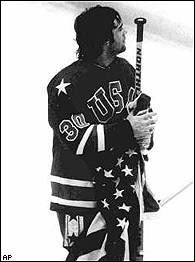 |
 |
 |
 News from Around the Americas | February 2005 News from Around the Americas | February 2005  
Team of Dreamers: 25 Years Ago
 Linda Robertson - Herald.com Linda Robertson - Herald.com

Where were you on Feb. 22, 1980? During the past quarter century, it has become one of those days frozen in our memories, like the day man walked on the moon.
 
The significance of the U.S. Olympic hockey team's 4-3 upset of the Soviet Union in the semifinals of the Lake Placid Games has taken on a nostalgic glow that seems to brighten with age.

So much has changed since we danced to disco and pecked on typewriters. But the boys of winter remain in the mind's eye, skating euphorically around the rink after the most improbable of victories. It is still the prime example of the unique power of the Olympics.

"Do you believe in miracles? Yes!" announcer Al Michaels cried as the game - which was not televised live - ended and spectators went berserk.

Tonight, 18 members of the gold-medal-winning team will return to the ice for a 25th anniversary celebration and a tribute to coach Herb Brooks, who died in a 2003 car accident.

A Common Foe

The collection of American collegiate and minor-league players was no Dream Team. It was a team of dreamers, as goaltender Jim Craig is fond of saying.

They were knit together by a ruthless, brilliant coach they loved to hate. They came from behind in six of their seven games. In the semis, they beat the best team in the world; the Soviets had defeated the NHL All-Stars. In the gold-medal game, the U.S. beat Finland 4-2. We remember their reactions. Craig searched for his widowed father in the stands while draped in the flag. Team captain Mike Eruzione invited his teammates onto the podium for the ceremony. Brooks locked himself into a bathroom stall for 15 minutes, preferring isolation to adulation.

"It was ultimately the U.S. players' endurance that made them so endearing and so heroic. They endured their coach and his ceaseless demands and mind games," author Wayne Coffey writes in his book The Boys of Winter. "They kept falling behind. They kept coming back."

The Soviets were crushed by the loss to the Americans, which was not mentioned in Pravda the next day. They believe the turning point came when their brow-beating coach, Viktor Tikhonov, pulled goalie Vladislav Tretiak at 2-2. They said Tikhonov panicked.

"The biggest mistake of my career," Tikhonov says in Coffey's book.

As for the silver medals? "I don't have mine. I think it is in garbage in Lake Placid," Sergei Makarov says.

After the Soviets left the Olympic Village, the cleanup crew found 121 empty vodka bottles in the dropped ceilings of their rooms.

Twenty-five years later, a million visitors annually make the pilgrimage to the rink and its Olympic museum in Lake Placid, N.Y. Craig and Eruzione still receive hundreds of fan letters.

Because of the time, place and nationalistic nature of the Olympics, that team has meant more to Americans than any pro or Olympic team since. Michael, Magic and Bird in 1992? They were supposed to win, and simply flaunted American dominance and wealth. The Magnificent Seven, led by the limping Kerri Strug in 1996? By then the Cold War was over, and Atlanta turned out to be a tacky showcase of the worst in American commercialism.

But Lake Placid in 1980 was magical. Americans needed some good news at a time of gas-rationing inflation, the Iranian hostage crisis and the Soviet invasion of Afghanistan. President Jimmy Carter had ordered a boycott of the 1980 Summer Olympics in Moscow.

Lake Placid, an Adirondack hamlet of 2,800 people, overcame transportation problems to play host to a homey, simple Olympics. Eric Heiden won five gold medals on the outdoor speedskating oval. And the hockey team made Americans smile.

Big Business

The Lake Placid Games, which some Olympic historians are calling the last "small" Games, cost $168 million to stage. Contrast that with the $2 billion cost of the 2002 Salt Lake City Games or the $1 billion spent on security at the 2004 Summer Athens Games.

The price tag just to present an attractive bid for the 2012 Games in New York City is $50 million, for an Olympics with a projected budget of $3.1 billion.

Like everything else in sports, the money spent on the Olympics has reached ridiculous levels. Money has alienated so many sports fans, corrupted so many athletes and, last week, killed the NHL season. The Olympics might sink under their own ballooning weight.

But this week, as Lake Placid commemorates its little-town-that-could Games, New York is wooing the International Olympic Committee's site evaluators, who are in the Big Apple on the third stop of a tour that includes Madrid, London, Paris and Moscow. Paris is the 2012 favorite, especially since New York's $1.4 billion West Side Stadium plan is in trouble, but stranger things have happened - such as Atlanta beating out Athens in 1996.

So much has changed since Brooks wore plaid sport jackets in 1980. Since then, the Soviet Union has dissolved, the U.S. has invaded Afghanistan, and the Olympics have become yet another marketing and entertainment vehicle for corporations.

The Miracle on Ice melts jaded feelings. The 1980 team again uplifted Americans in 2002, five months after the 9/11 attacks, when they reunited to light the cauldron at the Salt Lake City Games. Their presence also reminded us of the inspirational reach of the Olympics, which had been tarnished by the Salt Lake bid-bribery scandal.

Craig re-lit the Lake Placid cauldron last week, symbolically proving the best thing about memories: They can never be extinguished. | 
 | |
 |



